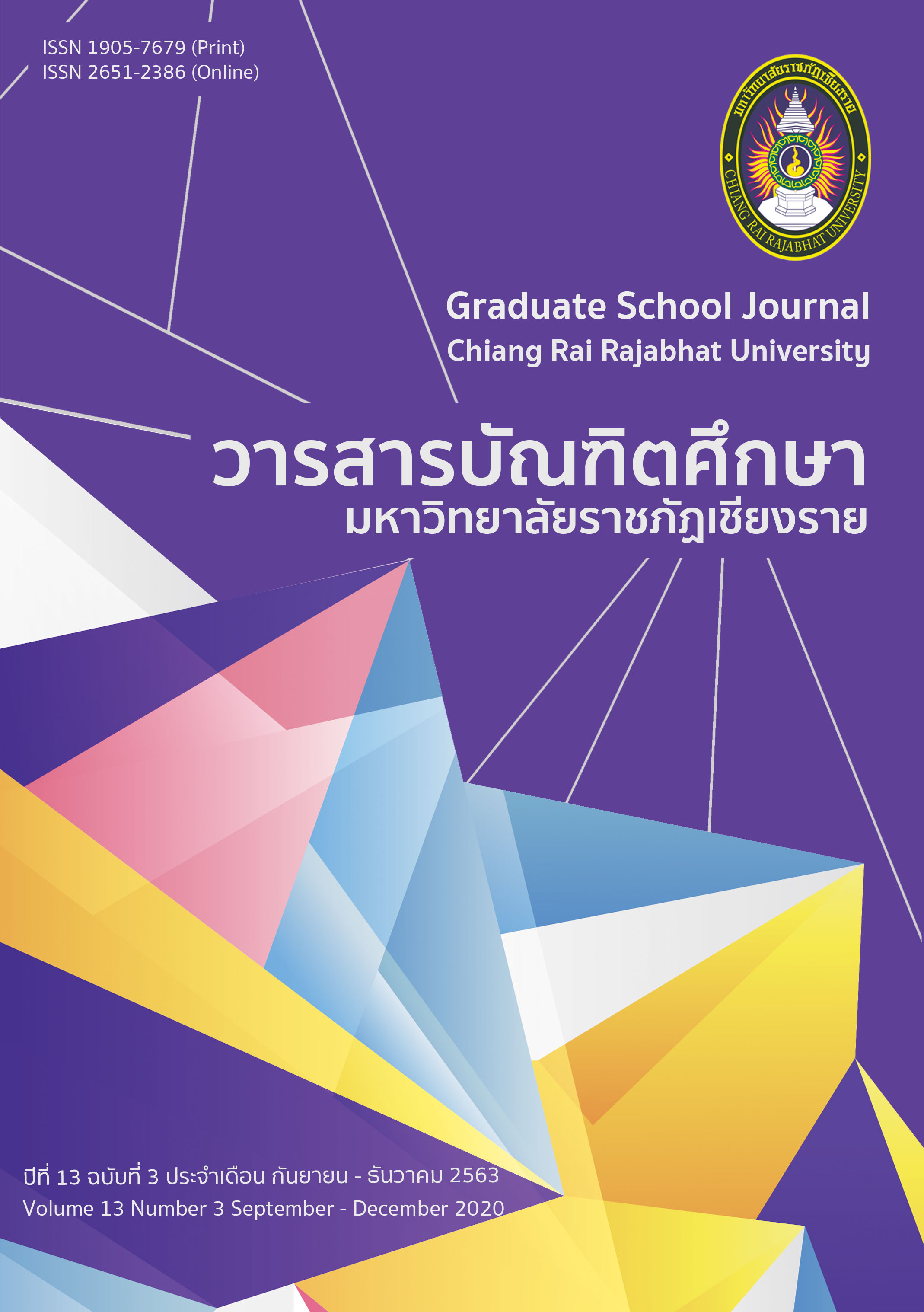การพัฒนาศักยภาพกลุ่มแม่บ้านตำบลแม่สลองนอก อำเภอแม่ฟ้าหลวง จังหวัดเชียงราย เพื่อการเข้าสู่มาตรฐานระบบการจัดการผลิตภัณฑ์ของชุมชน
Main Article Content
บทคัดย่อ
งานวิจัยนี้มีวัตถุประสงค์เพื่อพัฒนาศักยภาพกลุ่มแม่บ้านให้สามารถเข้าสู่มาตรฐานระบบการจัดการผลิตภัณฑ์ของชุมชน เก็บรวบรวมข้อมูลจากกลุ่มแม่บ้านตำบลแม่สลองนอก อำเภอแม่ฟ้าหลวง จังหวัดเชียงราย จำนวน 3 กลุ่ม คือ 1) กลุ่มน้ำพริกบ้านตงจาใส จำนวน 10 คน 2) กลุ่มผ้าปักลายเย้าบ้านเลาสิบ จำนวน 17 คน 3) กลุ่มแม่บ้านลีซอผ้าปักบ้านธาตุ จำนวน 11 คน เครื่องมือที่ใช้ในการศึกษา แบ่งออกเป็น 3 ชุด คือ 1) แบบสัมภาษณ์ 2) แบบวิเคราะห์สถานการณ์ และ 3) แบบประเมินศักยภาพ โดยการวิเคราะห์เนื้อหาสาระ การวิเคราะห์เชิงบรรยาย และวิเคราะห์ข้อมูลโดยใช้โปรแกรมสถิติสำเร็จรูป สถิติที่ใช้ ได้แก่ ค่าความถี่ ค่าร้อยละ นำเสนอผลการวิเคราะห์ข้อมูลในรูปของตารางประกอบคำบรรยาย
การประเมินศักยภาพของกลุ่มแม่บ้านตามมาตรฐานระบบการจัดการผลิตภัณฑ์ชุมชนผลการศึกษาพบว่า 1) กลุ่มน้ำพริกบ้านตงจาใส ในภาพรวมกลุ่มจัดอยู่ในระดับศักยภาพค่อนข้างต่ำ โดยส่วนใหญ่กลุ่มยังไม่มีการจัดทำเอกสาร/หลักฐาน ตามระบบ 2) กลุ่มผ้าปักลายเย้าบ้านเลาสิบ ในภาพรวมกลุ่มจัดอยู่ในระดับศักยภาพปานกลาง โดยส่วนใหญ่มีเอกสาร/หลักฐาน ตามข้อกำหนด แต่ยังไม่มีการนำไปปฏิบัติอย่างเป็นระบบครบถ้วน 3) กลุ่มลีซอผ้าปักบ้านธาตุ ในภาพรวมกลุ่มจัดอยู่ในระดับศักยภาพปานกลาง โดยส่วนใหญ่มีเอกสาร/หลักฐาน ตามข้อกำหนด แต่ยังไม่มีการนำไปปฏิบัติอย่างเป็นระบบครบถ้วน
จากการศึกษาศักยภาพการบริหารจัดการของกลุ่ม และการประเมินศักยภาพตนเองของกลุ่มแม่บ้านตามมาตรฐานระบบการจัดการผลิตภัณฑ์ชุมชน จำนวน 3 กลุ่ม พบว่า กลุ่มแม่บ้านตำบลแม่สลองนอกยังขาดความรู้ความเข้าในการบริหารจัดการด้านบัญชีและการเงิน อีกทั้งการออกแบบปรับปรุง พัฒนาผลิตภัณฑ์หรือบรรจุภัณฑ์ยังไม่สอดคล้องกับแนวทางความต้องการของตลาด และจากการพัฒนาศักยภาพด้านการบริหารจัดการด้านบัญชีและการเงิน พบว่า กลุ่มแม่บ้านมีความรู้ความเข้าใจเกี่ยวกับบัญชีและ
การเงิน สามารถคำนวณต้นทุนการผลิต ทั้งด้านการจัดทำระบบบัญชี การบริหารเงิน และการจัดการทางการเงิน อย่างมีประสิทธิภาพ รวมทั้งสามารถเข้าใจในการใช้ข้อมูลทางบัญชีในการวางแผนการเงินและภาษี การจัดทำแผนบริหารเงิน และการจัดการทางการเงิน ตามหลักวิชาการที่ถูกต้อง ซึ่งจะส่งผลให้กลุ่มแม่บ้านรู้สถานะที่แท้จริงของการดำเนินงานได้อย่างถ่องแท้อีกด้วย อีกทั้งยังมีการพัฒนาด้านผลิตภัณฑ์และบรรจุภัณฑ์ พบว่า กลุ่มแม่บ้านได้มีการพัฒนา ปรับปรุง และเปลี่ยนแปลงฉลากผลิตภัณฑ์ให้ตรงตามความต้องการของผู้บริโภค และสอดคล้องกับตัวสินค้า และทั้งมีการออกแบบสติกเกอร์บรรจุภัณฑ์ที่สอดคล้องกับตัวผลิตภัณฑ์ของแต่ละกลุ่มแม่บ้าน
แนวทางการพัฒนาศักยภาพของกลุ่มแม่บ้านในการบริหารจัดการผลิตภัณฑ์ชุมชน ให้มีความเข้มแข็งและสามารถเข้าสู่มาตรฐานระบบการจัดการผลิตภัณฑ์ของชุมชน ผลการศึกษาพบว่า หน่วยงานภาครัฐควรเข้ามามีส่วนร่วมในการสนับสนุน ส่งเสริมการขอรับมาตรฐานผลิตภัณฑ์ชุมชนของกลุ่มแม่บ้าน หรือควรมีการถ่ายทอดความรู้ ความเข้าใจในกระบวนการหรือขั้นตอนการยื่นขอมาตรฐานและระบบมาตรฐานสินค้าประเภทต่าง ๆ ที่สะดวกไม่ยุ่งยากซับซ้อนและทราบผลเร็ว หากเป็นไปได้ต้องการให้หน่วยงานภาครัฐจัดเจ้าหน้าที่ผู้ตรวจประเมิน และให้คำปรึกษา คำแนะนำในลักษณะเป็นพี่เลี้ยง โดยจะเป็นแนวทางที่กลุ่มแม่บ้านสามารถนำมาปฏิบัติได้และมีความคล่องตัวในการดำเนินงานได้อย่างมีประสิทธิภาพ เพื่อให้กลุ่มแม่บ้านดำเนินการจัดทำสินค้าให้ตรงกับมาตรฐานผลิตภัณฑ์มากที่สุด อีกทั้งการกำหนดแผนการส่งเสริมการตลาด และควรมีการสนับสนุนงบประมาณในลักษณะโครงการ/กิจกรรม ของหน่วยงานภาครัฐ เพื่อพัฒนาผลิตภัณฑ์ให้มีคุณภาพมากขึ้นซึ่งจะทำให้คุณภาพของผลิตภัณฑ์เพิ่มขึ้นและกลุ่มแม่บ้านเกิดแรงจูงใจที่จะขอรับรองมาตรฐานผลิตภัณฑ์ชุมชนต่อไปอันจะทำให้กลุ่มแม่บ้านเห็นคุณค่าและประโยชน์ของการได้รับรองมาตรฐานผลิตภัณฑ์ชุมชนให้มากขึ้น
Article Details
บทความที่ได้รับการตีพิมพ์เป็นลิขสิทธิ์ของวารสารมหาวิทยาลัยราชภัฎเชียงราย
ข้อความที่ปรากฏในบทความแต่ละเรื่องในวารสารวิชาการเล่มนี้เป็นความคิดเห็นส่วนตัวของผู้เขียนแต่ละท่านไม่เกี่ยวข้องกับมหาวิทยาลัยราชภัฎเชียงราย และคณาจารย์ท่านอื่นๆในมหาวิทยาลัยฯ แต่อย่างใด ความรับผิดชอบองค์ประกอบทั้งหมดของบทความแต่ละเรื่องเป็นของผู้เขียนแต่ละท่าน หากมีความผิดพลาดใดๆ ผู้เขียนแต่ละท่านจะรับผิดชอบบทความของตนเองแต่ผู้เดียว
เอกสารอ้างอิง
คณิดา ไกรสันติ และ รัสมนต์ คำศรี. (2559). แนวทางการพัฒนาศักยภาพกลุ่มวิสาหกิจชุมชนสุชาวดี ตำบลปริก อำเภอสะเดา จังหวัดสงขลา. ใน การประชุมหาดใหญ่วิชาการระดับชาติ และนานาชาติ ครั้งที่ 7 23 มิถุนายน 2559 (หน้า 554-566). สงขลา: คณะบริหารธุรกิจ มหาวิทยาลัยหาดใหญ่.
ธานินทร์ ศิลป์จารุ. (2549). การวิเคราะห์จุดแข็ง จุดอ่อน โอกาส และอุปสรรคของธุรกิจผลิตสินค้าหนึ่งตำบลหนึ่งผลิตภัณฑ์. วารสารวิชาการคุรุศาสตร์อุตสาหกรรม, 1(2), 3-16.
สำนักนายกรัฐมนตรี. สำนักงานคณะกรรมการพัฒนาการเศรษฐกิจและสังคมแห่งชาติ. แผนพัฒนาเศรษฐกิจและสังคมแห่งชาติฉบับที่สิบสอง พ.ศ. 2560-2564. กรุงเทพฯ: สำนักฯ.
เสาวลักษณ์ จิตติมงคล, สมพร นนทภา และ ยุพาภรณ์ ชัยเสนา. (2558). รูปแบบการพัฒนาศักยภาพกลุ่มแม่บ้านแปรรูปเนื้อสัตว์เข้าสู่มาตรฐานระบบการจัดการผลิตภัณฑ์ชุมชน (มจก.) กรณีศึกษา กลุ่มแม่บ้านแปรรูปเนื้อสัตว์บ้านนาจารย์ อำเภอเมือง จังหวัดกาฬสินธุ์ : รายงานการวิจัย. กาฬสินธุ์: มหาวิทยาลัยเทคโนโลยีราชมงคลอีสาน วิทยาเขตกาฬสินธุ์.


